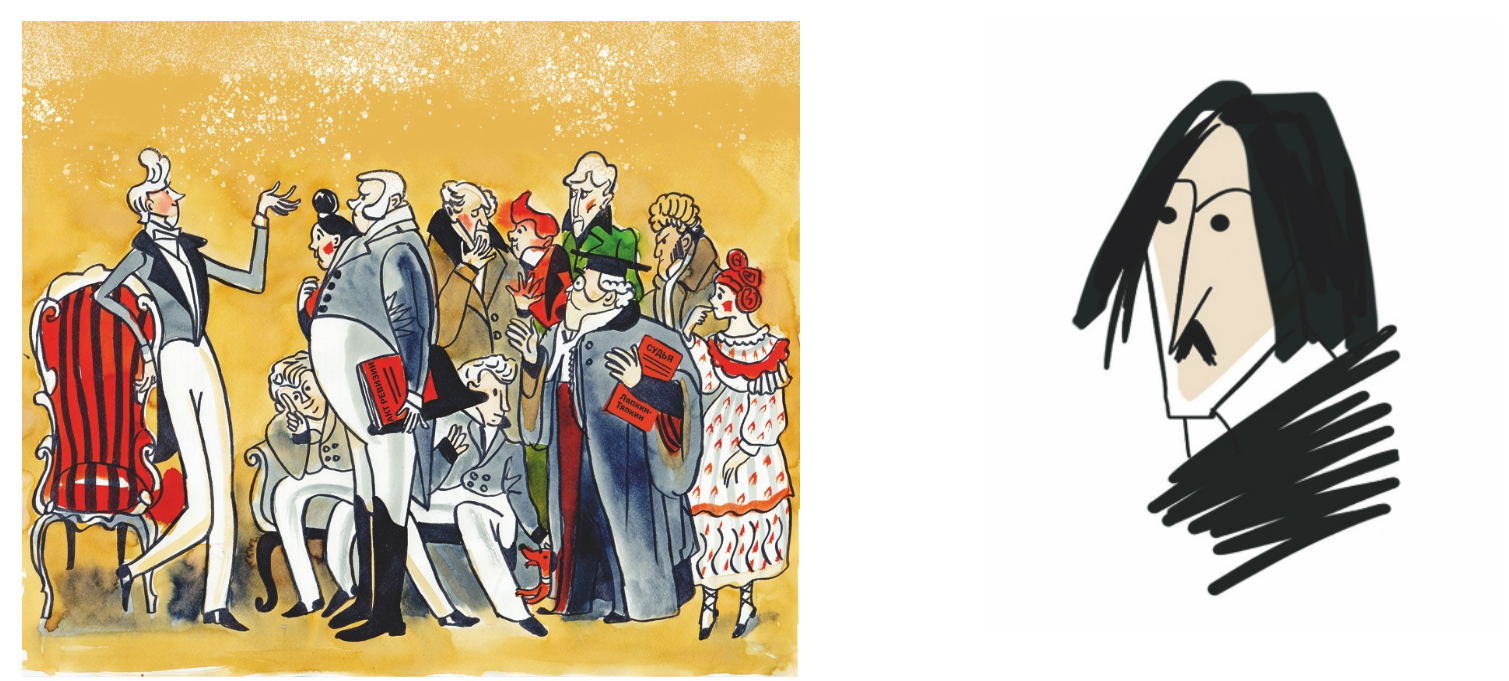"The Government Inspector" (1835)

"The Government Inspector" also known as “The Inspector General” by Nikolay Gogol
As is known, the plot of the comedy “The Government Inspector” was suggested to Nikolay Gogol by Alexander Pushkin himself. The classic of Russian literature had found himself in a similar real-life predicament when, while working in the archives with documents about Yemelyan Pugachev’s rebellion, he was mistaken for a government inspector. Somewhat later, Alexander Pushkin also learned of an incident in the Novgorod province where a minor official posed as an inspector, deceiving and swindling unsuspecting local residents.
Nikolay Gogol wrote the play in just two months and presented it at a literary gathering hosted by Vasily Zhukovsky. The work received mixed reviews—some listeners failed to appreciate this "Russian anecdote." But Zhukovsky persistently defended “The Government Inspector” and, despite serious doubts of Nicolas I about Gogol’s reliability and the comedy itself, convinced the emperor to permit its staging at the Alexandrinsky Theatre. Gogol was disappointed with the production, as the actors completely failed to grasp the sharp satirical nature of the text and instead presented the audience with an ordinary vaudeville. Striving for perfection in style and plot, Gogol continued refining the comedy for nearly six more years.
At the heart of Gogol’s comedy “The Government Inspector” lies the story of provincial officials in a district town who mistake the identity of an expected inspector from St. Petersburg. The panic displayed by local authorities in anticipation of this audit can be attributed to several peculiarities of governance in Nicholas I’s Russia.
Although some functions of municipal administration were carried out by the Assembly of Estates (Soslovnaya Duma), composed of a mayor and several deputies, primary control rested in the hands of the town governor (gorodnichiy). After the Patriotic War of 1812, town governors and city administrators were often appointed from among retired military officers. Crime prevention was far from their main duty—their responsibilities also included maintaining the fire brigade, urban infrastructure, organizing fairs, managing charitable institutions, overseeing prisons, fire prevention, quartering military units, and proper record-keeping.
The transition of former officers into civil service was frequently carried out with great difficulties. This was reflected in their tendency toward authoritarian management styles, epitomized by the use of brute force, including corporal punishment meted out by police officials against the taxable population. As the highest imperial authority in a district town, many town governors positioned themselves as the sole source of power, leading to widespread abuse of authority. Bribery and involvement in corrupt schemes became commonplace, partly due to the state’s failure to provide officials with a decent standard of living.
The situation was further complicated by the fact that the mechanisms for overseeing district authorities were procedurally convoluted and unsystematic, as well as lacking necessary official clarifications. An audit of a town governor’s activities could lead to his dismissal and loss of his sole source of income, and in some cases, become grounds for criminal prosecution.
Under modern legal standards, Khlestakov's actions could be classified as fraud. Pursuant to Article 159.1 of the Criminal Code of the Russian Federation, this offense entails the acquisition of monetary funds from state officials and members of the public by means of abusing their trust. The penalties for such an offense include a fine or compulsory labor.
The 1832 Code of Laws classified deceit into two categories: property-related fraud deceptive acts and forgeries. Under this classification, swindling fell into the first group, but Russian legislators long failed to establish a strict legal distinction between swindling, theft, and robbery. The issue could also stem from the fact that district officials would hardly agree to publicize the deception of government servants by a common swindler.
Nearly two centuries have passed since the play’s publication, yet the tale of the foolish chatterbox Khlestakov remains strikingly relevant. The situation in which the respectable and intelligent Governor Skvoznik-Dmukhanovsky and his numerous subordinates became entangled in a truly grotesque story still makes readers both laugh and cry. Gogol’s satire spares no social class, affirming the enduring value of honesty, dedication to duty, integrity, and the desire to devote oneself to serving the state and people. Gogol's text contains no positive characters except for the denunciatory laughter that destroys bureaucracy and bribery. The comedy's characters are meticulously crafted, with precise stage directions and witty stylistic devices creating vivid, three-dimensional portraits of each personage. To this day, N.V. Gogol's admonition remains relevant: "Don't blame the mirror if your face is crooked...".
Signs and Symbols in the Illustration
State Governance under Emperor Nicholas I